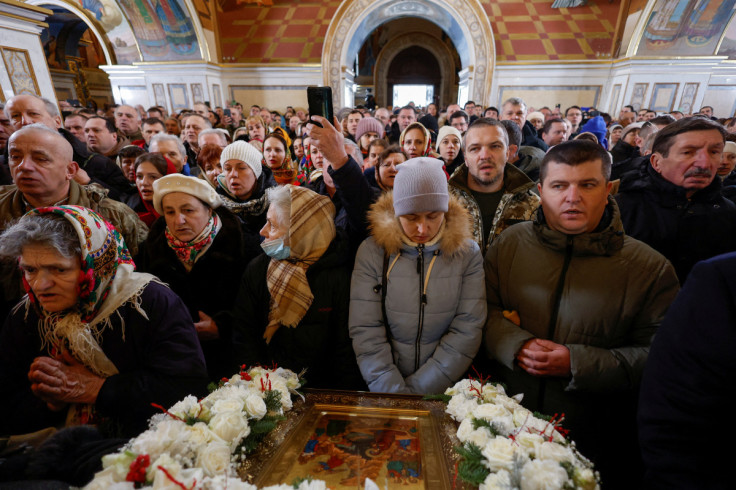Christmas Joy And Anger For Rival Orthodox Churches In Historic Kyiv Monastery

Tears of joy streamed down worshippers' faces as Ukraine's main church celebrated a "return" to Kyiv's Cathedral of the Assumption on Orthodox Christmas day, shortly after taking control of it from a rival church with alleged ties to Russia.
The golden-domed cathedral, of huge cultural and religious significance, sits on a high hill in the centre of Kyiv by the river Dnipro, and forms part of the 980-year-old Kyiv-Pechersk Lavra monastery complex, also containing chapels and administrative buildings.
It has become a focus of a bitter conflict between Ukraine's Orthodox communities, triggered by Russia's invasion.
Members of the Orthodox Church of Ukraine (OCU), Ukraine's largest, piled into the cathedral's ornate interior on Saturday, to hear the first ever Ukrainian-language service in the cathedral.
"During these days of festivities, with strong feelings we ask God: help us to defeat the enemy, who brought grief into our home. Help us to finally drive out the foreign invasion from the Ukrainian land," said the OCU's Patriarch Epifaniy I.
Vadym Storozhyk, a 50-year-old Kyiv city councillor, said the Christmas service meant to him a 'return' of a holy site under Ukraine's control.
"30 years after renewing our history and gaining our independence -- we return to our holy places, to our (spiritual) sources," he said.
Ukraine's culture minister Oleksandr Tkachenko, who attended the service with the speaker of Ukraine's parliament, posted a message on Facebook celebrating what he said was the end of three and a half centuries of the Kyiv-Pechersk Lavra's "capture" by Moscow.
Ukraine's Orthodox Church, in its various iterations, has been subordinate to Moscow since the 17th century.
Ukraine has about 30 million Orthodox believers, divided between different church communities. The war, now in its eleventh month, has led many Ukrainians to rally round the OCU, which they see as more pro-Ukrainian than its rival, the Ukrainian Orthodox Church (UOC).
The UOC was officially under the wing of Russia's Orthodox Church until May 2022 but announced a severing of ties due to the Moscow church's support for the war.
President Vladimir Putin on Saturday praised the Russian Orthodox Church for supporting Moscow's forces fighting in Ukraine in an Orthodox Christmas message and called it an important stabilising force in society.
Despite cutting ties, the UOC still faces allegations of pro-Russian views and direct collaboration with Moscow, which it denies, from Ukraine's government and from much of Ukraine's press and civil society. The UOC says it is the victim of a political witch-hunt by its enemies in government.
The UOC was evicted from the cathedral after its lease from the government expired.
The handover of the cathedral took many by surprise - an OCU priest, Vasyl Rudnytskyi, looked stunned as he walked towards the building's gates amid the deafening pealing of bells.
"I didn't even consider the possibility of this two weeks ago, or the fact that we would celebrate Jesus' birth in such a meaningful place for the Ukrainian people," he said.
RIVALS
The OCU was established in 2019 and recognised as Ukraine's official branch of Orthodoxy by Ecumenical Patriarch Bartholomew of Istanbul, the global head of the Orthodox Church.
That decision infuriated Russia's Orthodox Church, as Istanbul had previously recognised the UOC, then under Moscow's rule, as the legitimate Ukrainian church.
Some of the UOC's clergy and many of its worshippers moved to the OCU, to the former organisation's dismay. Both churches say the other is canonically illegitimate. Although the OCU soon had more worshippers than the old church, the UOC maintained control of over 12,000 churches, including the Kyiv-Pechersk Lavra complex.
Ukraine's government institutions and local press often refer to the UOC as the "Moscow Patriarchate", a label the church rejects. A poll last August showed the UOC only retaining 20% of its worshippers from 2021, suggesting many had left it since the invasion, but the church told Reuters this data didn't correspond to reality.
In a chapel on the monastery's grounds, the UOC's spokesman, Metropolitan Kliment, told Reuters the government's actions were a "provocation intended to upset and humiliate millions of UOC worshippers."
Lyudmyla, a 69-year-old worshipper, said she feared the government was biased against the UOC.
"I don't like this. We need to be united not divided, right now. And this could lead to some kind of religious split (in our society)," she said.
The UOC's monasteries and churches, including the Kyiv-Pechersk Lavra, faced a wave of searches by Ukrainian security forces and the police have announced a string of investigations.
Authorities said they found pro-Russian literature and Russian citizens being harboured on church premises, something the UOC denied.
© Copyright Thomson Reuters 2024. All rights reserved.





















